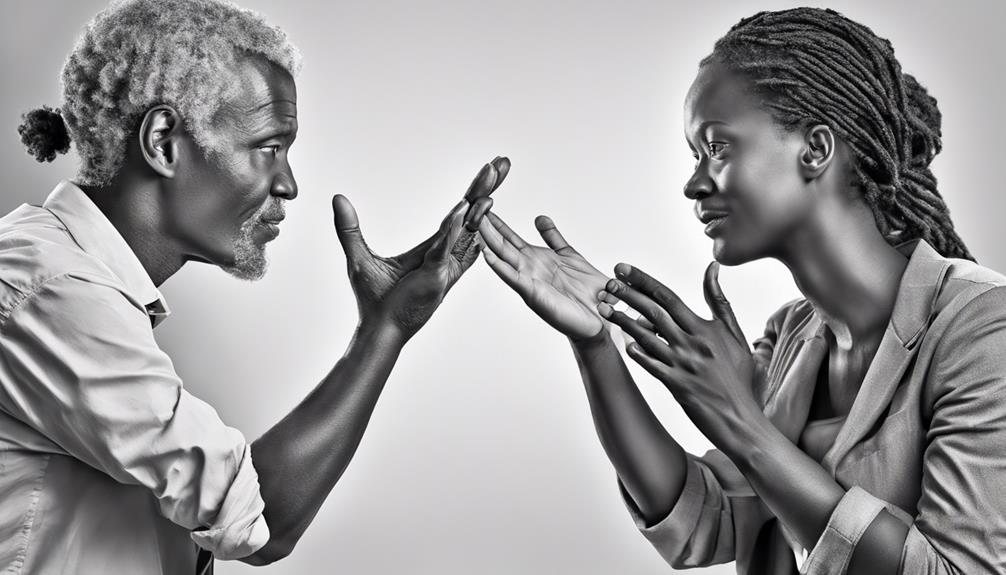We have all been guilty of using phrases that may unintentionally offend people who are hearing impaired.
It's time we reassess our communication habits and strive for more inclusive and respectful interactions. By avoiding common pitfalls and choosing our words thoughtfully, we can foster better understanding and create a more welcoming environment for everyone involved.
So, how can we navigate this delicate territory with grace and sensitivity?
Key Takeaways
- Use respectful language like 'Deaf' or 'hard of hearing' instead of offensive terms.
- Show empathy by acknowledging the impact of hurtful words on individuals with hearing loss.
- Embrace sign language basics to empower expression and foster inclusivity.
- Maintain a neutral or positive tone, speak clearly, and adjust volume for effective communication.
Common Rude Phrases to Avoid
When interacting with individuals who are hearing impaired, it's crucial to be mindful and avoid using common rude phrases that can be offensive or demeaning. Language holds immense power, especially when communicating with Deaf individuals.
Outdated terms like 'deaf and dumb' should be replaced with more respectful language. Instead of saying 'suffering from hearing loss,' it's better to use neutral terminology to avoid any negative implications. Refrain from using phrases like 'hearing impaired' as it can come across as derogatory.
When referring to individuals who are Deaf and use sign language, opt for phrases like 'Deaf individual who uses sign language' rather than outdated terms like 'deaf-mute.' It's essential to steer clear of expressions like 'handicapped by deafness' to prevent stigmatization.
The Impact of Harmful Language

When we use harmful language towards individuals who are hearing impaired, we contribute to perpetuating negative stereotypes and stigmas.
It's crucial to communicate with empathy, using respectful and inclusive language, to foster understanding and acceptance within the deaf and hard of hearing community.
Language and Stigma
Using respectful and inclusive language is crucial in combatting the stigma associated with hearing loss. Referring to individuals as 'deaf' acknowledges their identity without attaching negative connotations.
Additionally, mentioning 'hearing aids' can highlight tools that assist individuals rather than focusing solely on their disability. Terms like 'deaf and dumb' or 'deaf-mute' aren't only outdated but also perpetuate harmful stereotypes, contributing to the stigma surrounding hearing loss.
Our language choices play a significant role in shaping perceptions and interactions. By promoting person-first language and educating others on the impact of words, we can foster a more inclusive and understanding society.
Let's embrace respectful terminology to empower individuals and break down barriers created by harmful language.
Empathy in Communication
Acknowledging the impact of harmful language on individuals with hearing loss is essential in fostering empathy and promoting positive communication. Hurtful words can lead to feelings of exclusion and lower self-esteem within the Deaf community.
Choosing respectful and inclusive language, like addressing individuals as 'Deaf' or 'hard of hearing,' shows understanding and consideration. Empathy in communication involves recognizing the effects of our words and opting for terms that honor people's identities.
Respect and Dignity
Respecting individuals with hearing loss involves using language that acknowledges their identity and abilities, fostering inclusivity and dignity within the Deaf community.
Referring to Deaf people as 'hearing impaired' can be offensive and diminish their sense of self-worth. Using terms like 'Deaf' or 'hard of hearing' shows respect for their community and individuality.
Harmful language perpetuates stereotypes and can harm relationships with Deaf individuals. By being mindful of our words, we create a more understanding environment for everyone.
Respectful communication not only shows empathy but also builds positive connections with Deaf people. Embracing respectful language is a crucial step towards creating a society that values the dignity and worth of all individuals, including those with hearing loss.
Alternative Ways to Communicate

Let's explore some alternative ways to communicate with individuals who are hearing impaired.
Sign language basics and visual aids can be valuable tools in facilitating effective communication.
Sign Language Basics
Learning basic sign language can provide a valuable means of communication for bridging gaps and fostering inclusivity within the Deaf and hard of hearing community. Here are four reasons why learning how to sign is essential:
- Empowerment: By learning sign language, we empower individuals to express themselves freely and participate more actively in various social settings.
- Connection: Sign language creates a deeper connection by allowing us to communicate directly with Deaf individuals, promoting understanding and empathy.
- Inclusivity: Embracing sign language promotes inclusivity by ensuring that everyone, regardless of their hearing ability, can engage in meaningful conversations.
- Cultural Appreciation: Learning sign language demonstrates respect for Deaf culture and showcases a willingness to learn and adapt for the betterment of the community.
Visual Aids for Communication
Utilizing visual aids such as sign language, gestures, and facial expressions can significantly enhance communication for individuals who are deaf, hard of hearing, or non-verbal. Picture boards, communication cards, and written notes are effective tools that bridge the communication gap.
Visual aids play a crucial role in promoting inclusivity and understanding during interactions. By incorporating visual aids, we show respect for diverse communication needs and foster effective communication with those who may face challenges in hearing or speaking.
These aids not only facilitate smoother interactions but also create a more inclusive environment where everyone feels valued and understood. Let's continue to embrace visual aids as essential tools in enhancing communication and building connections with others.
Respectful Communication Tips

When communicating with individuals who are hearing impaired, it's important to acknowledge their efforts and abilities without implying limitations due to their condition. Here are some tips to ensure respectful communication:
- Acknowledge Their Efforts: Recognize the hard work individuals with hearing impairment put into developing their communication skills.
- Avoid Backhanded Compliments: Use phrases like 'You speak very well' to acknowledge their efforts without condescension. Avoid ending compliments with phrases like 'for someone with hearing loss.'
- Stay Positive and Encouraging: Focus on their abilities rather than their limitations. Encouragement and positivity can go a long way in fostering effective communication.
- Respect Individuality: Refrain from comparing their situation to unrelated scenarios, such as gender-based scenarios. Treat each individual with the respect and understanding they deserve.
Words to Steer Clear Of

To communicate effectively and respectfully with individuals who are hearing impaired, it is crucial to be mindful of the words we use and to avoid phrases that may carry negative connotations or imply limitations. Instead of using outdated or potentially offensive terms, opt for language that respects the individual's identity and abilities. Here are some words and phrases to steer clear of when interacting with individuals who are hearing impaired:
| Avoid | Use Respectful Language |
|---|---|
| Hearing impaired | Person with hearing loss |
| Suffers from hearing loss | Person experiencing hearing challenges |
| Deaf and dumb | Deaf and nonverbal |
| Disabled by deafness | Person with lip reading skills |
Sensitivity in Conversations

Let's talk about the importance of word choice and tone of voice when engaging in conversations with individuals who've hearing loss.
The way we phrase our words and the tone we use can significantly impact how our message is received.
Being mindful and respectful in our communication can help foster understanding and connection.
Word Choice
In conversations about individuals who are deaf or hard of hearing, it's crucial to consider the sensitivity of our word choice to respect their preferences and identities.
- Choose Respectful Terms: Opt for 'deaf' or 'hard of hearing' over 'hearing impaired' to honor individual preferences.
- Focus on the Person, Not the Condition: Avoid phrases like 'suffers from hearing loss' and use neutral language that puts the person first.
- Person-First Language: Say 'person who's deaf' to emphasize the individual rather than their hearing status.
- Respect Diverse Perspectives: Understand that not all individuals in the deaf community view their deafness as a disability, so be cautious with terms like 'hearing disability'.
Tone of Voice
Considering the impact of our tone of voice is essential when engaging in conversations with individuals who are hearing impaired. It demonstrates respect and sensitivity towards their communication needs. Using a neutral or positive tone of voice shows consideration and empathy. It's important to avoid speaking in a condescending or pitying tone, as it can be hurtful.
Speaking clearly, steadily, and naturally fosters effective communication. Adjusting the volume of your voice to a comfortable level can enhance understanding and engagement. Maintaining a warm and friendly tone creates a welcoming atmosphere. By being mindful of our tone of voice, we can build positive relationships and ensure inclusivity in our interactions with individuals who are hearing impaired.
Communicating With Empathy

When complimenting individuals with hearing loss, it's important to acknowledge their effort and abilities without using phrases that may inadvertently belittle their accomplishments. Here are four key points to keep in mind when communicating with empathy:
- Appreciate Their Communication Skills: Instead of saying, 'You speak well for a Deaf person,' try phrases like 'You speak very well.' This acknowledges their skills without making unnecessary comparisons.
- Recognize Their Hard Work: Individuals with hearing loss put in significant effort to develop their communication skills. Acknowledge this dedication and hard work when praising their abilities.
- Avoid Comparisons: Refrain from comparing their situation to unrelated scenarios, especially those based on gender or other irrelevant factors. Focus on their abilities and achievements without unnecessary comparisons.
- Encourage and Support: Offer words of encouragement and support to individuals with hearing loss. Your positive reinforcement can go a long way in boosting their confidence and motivation.
Understanding Deaf Culture

Understanding Deaf Culture involves recognizing deafness as a unique cultural identity rather than viewing it as a disability. Deaf culture celebrates sign language as a primary mode of communication and values visual cues and facial expressions in interactions. Many deaf individuals choose not to get cochlear implants, as they may see deafness as an integral part of who they are. Additionally, deaf drivers have been shown to have comparable safety records to hearing drivers, with the added benefit of better peripheral vision.
To further understand the nuances of Deaf culture, let's take a look at the following table:
| Deaf Culture Characteristics | Description | Importance |
|---|---|---|
| Sign Language | Primary mode of communication for the deaf community | Vital for effective interaction within the community |
| Deaf Pride | Embracing deafness as a unique identity | Fosters a sense of belonging and empowerment |
| Cultural Norms | Value placed on visual communication and community support | Shapes social interactions and relationships |
Building Inclusive Language Habits

Let's prioritize inclusive language habits by choosing words that respect individuals' identities and communication preferences. When we know better, we can do better.
Here are some ways to build inclusive language habits:
- Use person-first language: Instead of labels like 'hearing impaired,' opt for phrases like 'people who are hard of hearing' to honor individuals' humanity.
- Focus on strengths, not limitations: Avoid phrases like 'deaf and dumb' and instead highlight abilities and strengths to empower individuals.
- Avoid patronizing remarks: Steer clear of comments like 'I feel sorry for you' or 'you're so brave' as they can unintentionally diminish someone's experiences.
- Acknowledge diverse communication methods: Recognize different communication preferences by using terms like 'person who uses sign language' or 'individual who communicates through lip reading' to show respect for individual choices.
Fostering Respectful Dialogue

To foster respectful dialogue, we prioritize using language that honors individuals' identities and communication preferences.
When interacting with hearing people, it's essential to be mindful of the words we use to describe their auditory status. Instead of outdated terms like 'hearing impaired,' opt for person-first language such as 'person with hearing loss' to emphasize the individual before their condition. Phrases like 'person who's deaf' or 'person who's hard of hearing' can also be used to describe someone's auditory status respectfully.
It's crucial to focus on the abilities and strengths of hearing people rather than solely on their hearing loss when engaging in conversation. Additionally, always respect the preferences of individuals when referring to their hearing status, prioritizing their dignity and comfort above all else.
Frequently Asked Questions
Is Saying Hearing Impaired Rude?
Saying 'hearing impaired' can be considered rude by some individuals in the Deaf and hard-of-hearing community. It's important to be mindful of terminology and respect how individuals prefer to be identified.
Using person-first language like 'person who's Deaf' or 'person with hearing loss' shows respect for their autonomy. Understanding and honoring their preferences is crucial in fostering a more inclusive and respectful environment for those with hearing differences.
What Can I Say Instead of Hearing Impaired?
When thinking about what to say instead of 'hearing impaired,' it's important to use terms like 'deaf,' 'hard of hearing,' or 'person with hearing loss' to show respect and accuracy. By choosing phrases like 'deaf community member' or 'individual who's hard of hearing,' we can honor their identity and experiences.
Let's avoid outdated or offensive terms, and focus on person-centered language like 'individual who uses sign language' or 'someone who communicates through lip reading.'
What Should You Not Say to a Hearing Impaired Person?
When talking to a hearing impaired person, it's crucial to be mindful of our words. Avoid phrases like 'You don't look deaf,' which can be dismissive. Refrain from apologizing for their condition or questioning the need for subtitles on TV.
Instead, show understanding and empathy. Making comments like 'I'm sorry you're deaf' or 'I can't live without music' can come off as insensitive. Let's choose our words carefully to show respect and consideration.
What Is the Inappropriate Term to Call a Deaf Person?
We avoid the term 'hearing impaired' when addressing Deaf individuals. It's outdated and can be disrespectful. It's better to refer to them as Deaf or hard of hearing, respecting their identity.
Using person-first language, like 'person who's Deaf,' shows consideration. Always ask for their preferred name or sign name to show respect.
It's crucial to use language that aligns with their preferences and acknowledges their individuality.
Is Using Abbreviations in Deaf Communication Considered Rude?
Some individuals may find using decoding deaf communication system abbreviations to be disrespectful, as it can be seen as excluding them from the conversation. However, others may find them helpful for efficient communication. It’s important to consider the preferences of the deaf person you are communicating with.
Conclusion
As we strive to communicate respectfully with individuals who are hearing impaired, it's important to be mindful of the impact of our words.
Did you know that 1 in 8 people in the United States aged 12 years or older has hearing loss in both ears?
Let's continue to practice empathy, understanding, and inclusive language to foster a more respectful dialogue with everyone we encounter.
Together, we can create a more inclusive and supportive environment for all.










